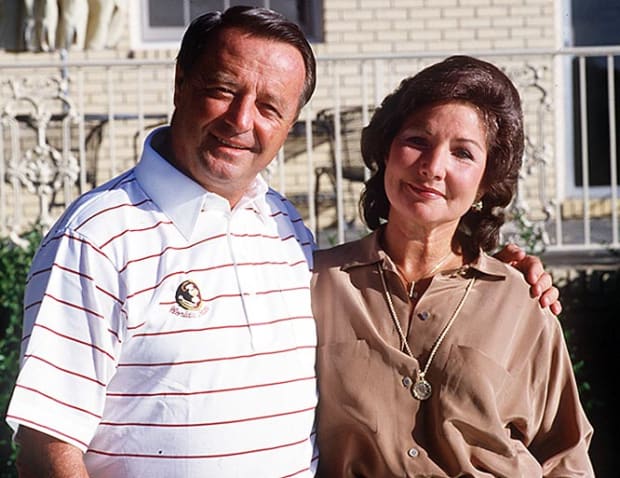New on Sports Illustrated: The Last of the Southern Charmers: Bobby Bowden's Legacy at Florida State And In College Football
He won in recruit's living rooms, in press conferences, at booster gatherings and at stadiums. At the age of 91, a college football legend has died.
The last of the college football Southern charmers has left us, and the sport is a little more bland in his wake. Bobby Bowden, who could win in a recruit’s living room, a press conference, a booster gathering or a stadium on Saturdays,
has died at age 91.Bowden didn’t just record 377 football victories. He recorded them while making just about everyone like him and laugh with him. In a profession that continues to trend further toward deadly seriousness at all times, Bowden excelled at making football fun to watch and fun to talk about. He was the most accessible of legends.
We likely won’t see another one like him, a most authentic product of Dixie who loved playing the role of a Southern Ball Coach—perhaps because he didn’t have to try hard to play it. Dabo Swinney has some similar folksiness, but some of his views have made him the kind of lightning rod Bowden never was. Ed Orgeron is very much Of The South, but a very particular subset of it—and his longevity remains to be seen.
Bowden was an Alabama boy who found his niche in the Florida panhandle—the Redneck Riviera, as it has been known. He built something entirely his own up there, hours removed from the big cities in the state. Then he never left. Tallahassee is hard to get to, and even harder to get a hotel room for a home football game, but he made it a destination.
In a stroke of marketing genius, Florida State hosted “Breakfast with Bobby” gatherings on fall Sundays for the media who covered Seminoles home games the day or night before. He got the beat writers and columnists from Miami and Fort Lauderdale and Tampa and Orlando and Jacksonville to show up, and he kept them coming back with great access and great stories and great teams.

Then the national media was hooked as well, drawn by a fresh powerhouse with a coach who welcomed everyone in. There were some warts at Florida State, from “Free Shoes University” to Peter Warrick’s shopping spree to an academic scandal, but Bowden’s agreeable demeanor probably helped him weather those situations without the kind of blowback others would have received.
Florida State had a few flickers of football success but nothing special before Bowden arrived in the mid-1970s. He went 5–6 his first season and then won forever, never recording a losing record until the NCAA vacated some victories in 2006 and ’07. Bowden knocked heads with Howard Schnellenberger and Jimmy Johnson and Dennis Erickson and Steve Spurrier and never blinked, putting FSU on even par with those powers and helping grow two of the elite rivalries in college football.
Yet for all his winning, Bowden was perhaps even more compelling—and so very human—in defeat. He lost heartbreakers to the Hurricanes on missed kicks that cost him national titles—once jogging down the sideline in exultation for what he thought was the winning field goal, only to have the officials signal yet another crushing miss. The losses hurt, but he never used them as license to lash out.
It wasn’t until 1993 that Bowden finally broke through and won a national championship. In his Orange Bowl press conference the day before that game against Nebraska, Bowden was (for the millionth time) asked about not winning the big one. He tried to explain to reporters why he wasn’t haunted by that.
“What’s the biggest award in y’all’s line of work,” he asked. “The poo-litzer?”
(To which New York Times columnist George Vecsey drolly and brilliantly replied, “Marriott points.”)
Bowden continued by saying that reporters could have successful and satisfying careers without winning a Pulitzer Prize. It was his way of saying he’d be OK regardless.
But he did go on to win that national title the following night—sweating out a missed Cornhuskers field goal at the end, of all things—and one more at the end of that decade. From 1987 through 2000, he never failed to win 10 or more games a year. If you want to know how impressive that is, Nick Saban will try to match that this year.
During Bowden’s tenure, Doak Campbell Stadium more than doubled in capacity—from 40,500 to 82,300. Enrollment nearly doubled as well, from 21,000 his first year on campus to more than 40,000 when he retired. Florida State also went from an independent to Atlantic Coast Conference membership and immediately became that league’s gold standard for football.
Bowden’s sustained success made less sense at FSU than it did at Florida, the state’s flagship university with SEC membership, or at Miami, sitting on that incredible gold mine of South Florida talent. And it has proven elusive over the last decade, with Jimbo Fisher winning a national title in 2013 but the program then atrophying and subsequently bottoming out the past three seasons.
There are reasons why Florida State has fallen behind, but it’s perhaps more remarkable that it had ever gotten so far ahead. That’s owed to Bobby Bowden, one of the more likable winners in college football history and the last of the Southern charmers in the coaching profession.
More on Bobby Bowden:
• Florida State Coach Bobby Bowden Just Loves to Drop in for a Visit
• No Quit in This Soldier: Bobby Bowden's Still Wily and Driven to Win
• Bobby Bowden Has a Team That Should Finally Win the National Title
• Remembering Bobby Bowden, a One-of-a-Kind College Football Giant








No comments